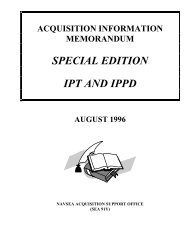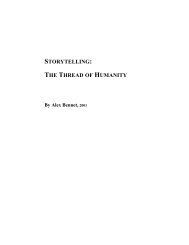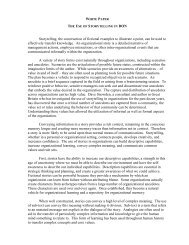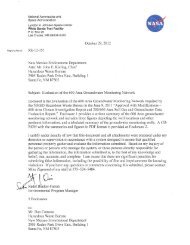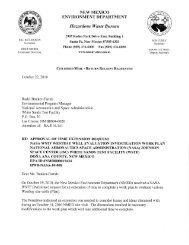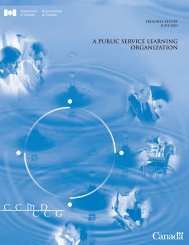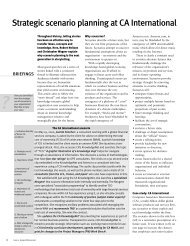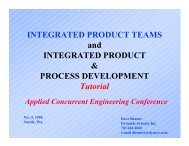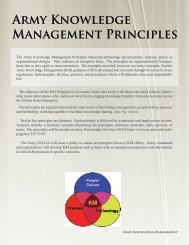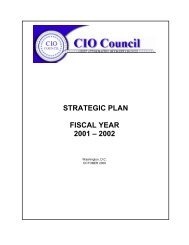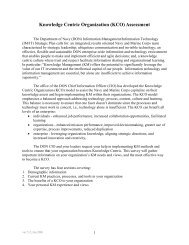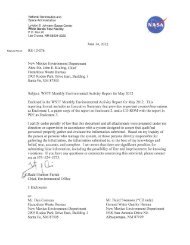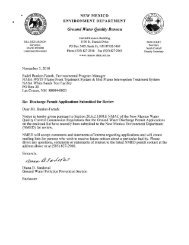NAVAL AVIATION SYSTEMS - NASA Wiki
NAVAL AVIATION SYSTEMS - NASA Wiki
NAVAL AVIATION SYSTEMS - NASA Wiki
Create successful ePaper yourself
Turn your PDF publications into a flip-book with our unique Google optimized e-Paper software.
CHAPTER XI: KEY TOPICS<br />
PART I: INTEGRATED LOGISTICS ASSESSMENT PROCESS<br />
Purpose: The Integrated Logistics Assessment (ILA) Branch (AIR-3.6.1.1), which is a product support team,<br />
conducts integrated logistics support (ILS) assessments on ACAT I through IV programs for the NAVAIR TEAM.<br />
The purpose of the assessment is to ensure the adequacy of the program's ILS planning, management, and<br />
execution. The assessments are accomplished on a schedule which supports each acquisition decision milestone<br />
and initial and full operational capability.<br />
Source Documents: SECNAVINST 4105.1 OF 30 May 1996<br />
Responsibility: AIR-3.6.1.1 publishes an ILA group program assignment list. The listing provides the ILA<br />
Product Support Team members and their telephone numbers who are assigned to each IPT. The listing is updated<br />
and published on a quarterly basis and as required (program changes, new programs, deletions, etc.)<br />
Assessment Initiation: The ILA product support team will establish contact with the PMA, IPT leader, APML,<br />
etc., to explain the ILA philosophy/process, which is to provide early and continuous involvement, and work with<br />
the IPT to resolve issues as they arise. The ILA team members will seek out each program IPT leader to set up<br />
schedules to meet and work with the IPTs. team review.<br />
The Assessment: The assessment team seeks to ensure all aspects of the ILS program are adequately analyzed<br />
during program development. The ILA team works up front, early and continuously with the IPT members to<br />
build a better program. The ILA team will recommend how to incorporate the policy requirements and<br />
programmatic issues into the milestone documentation and the PMAs program plans. The ILA team will work<br />
with the IPTs to identify what milestone and programmatic documentation is applicable through the tailoring-in<br />
process. The ILA team, with the input of element experts, will work with the IPTs to recommend and influence<br />
program goals and logistics readiness objectives and thresholds, make recommendations on specific policy to be<br />
complied with, as well as best practices and techniques to be applied. The ILA team must review the<br />
documentation while it is being prepared to be able to make recommendations as well as when the documentation<br />
is complete and approved by the proper authority. If the recommendations are made to and rejected by the IPT,<br />
and the ILA team considers the recommendations are necessary to an executable program; or is in violation with<br />
policy, or contradicts the direction of higher level program documentation, then the recommendation becomes an<br />
issue that requires resolution.<br />
Issue Resolution: The ILA team works with the IPTs to resolve any and all issues at the lowest level possible. If<br />
the issue is not resolved between the IPT and the ILA team the ILA will document the concern in the form of an<br />
issue paper. The issue paper will identify the impact if the concern is not resolved, and a recommended solution.<br />
The issue paper is forwarded to the ILA Branch Head for action. The resolution process is listed below:<br />
1. The ILA team presents the issue to the ILA branch head. If the branch head agrees with the IPT leader, the<br />
issued is closed.<br />
2. If the ILA branch head agrees with the ILA team, the issue is presented to the APEO(L) for resolution. If the<br />
APEO(L) agrees the issue is not appropriate, the issue is closed.<br />
3. If the APEO(L) agrees the issue should stand, the issue will be resolved as directed.<br />
57



